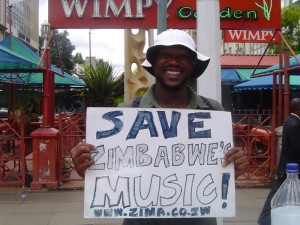 A week ago Carl J Ncube announced to a press conference that he would be spending a week living on First Street in Harare to raise public awareness about how piracy affects the local music industry. The public response as compared to the online response was disappointing.
A week ago Carl J Ncube announced to a press conference that he would be spending a week living on First Street in Harare to raise public awareness about how piracy affects the local music industry. The public response as compared to the online response was disappointing.
“I didn’t expect people in Zimbabwe not to respond to something as simple as moral support. All we’re asking them to do is sign and say that they appreciate Zimbabwean music. That even though they can’t afford to buy it, and they’re burning it, all we needed was just moral support, to say thank you, I’m burning your music, but thank you, I appreciate it.”
Very little has been made in the local press of Carl’s Street Campaign. According to Carl, junior entertainment reporters have submitted their stories about his campaign to The Herald’s editors. However they (the editors) did not feel that Carl’s Campaign, and by extension the welfare of local artists, was newsworthy.
As the country’s most widely read daily newspaper, I think The Herald has failed in its mandate to inform the public about our various entertainment artists and industries. I have seen columns and editorials indicting Roki and other artists for riding on combis, and lowering their status with fans. But, as the state media, they do nothing to promote local artists save for selling advertising space. Why was there no coverage for M’afriq’s last album, or even a profile of Stunner and the success that he has made of his career? And what about the underground music scene and fledgling artists who are yet to be discovered by the public?
I know the articles much like the one covering Carl’s campaign are written, but what use are they if they are not published? The Herald’s entertainment editors seem to only be interested in the type of journalism that destroys typified by the vitriolic and unsubstantiated article carried by The Herald last year about former Big Brother housemate Munyaradzi Chidzonga. The entertainment department of that paper should partially shoulder the blame for the state of our local music and entertainment industries.
It’s no wonder then that Sam Mtukudzi’s last performance was to an estimated gathering of 20 people and it is only now, in having passed away that he becomes newsworthy. Ironically, public sentiment about young artists can be summed up in what Carl was told on the street:
“People are saying its better if they just die, it’s better if they get broke, and we don’t need them. They’d prefer to buy and listen to Little Wayne.”
Even as the son of the virtually deified Oliver Mtukudzi, Sam only had a handful of articles published about him in The Herald since his career began with the release of his first album Rumwe Rimwe in 2007. Compare this to the media coverage received by Jamaican artist Sizzla, who was in Zimbabwe briefly for the President’s Birthday. He was featured in The Herald everyday for a week, and had a full double page spread on the weekend. As Carl rightly pointed out, we have become a nation that supports other people’s music industries.
“It really upsets me to see artists quitting their jobs. We know Zimbabwean artists have gone into industries like porn and prostitution. They’ve gone and changed careers, and at this rate, we won’t have any music. What we [as Zimbabweans] continue to do though is to build [other people's] industries. So people like Sizzla get paid forty thousand to perform in Zimbabwe, he goes back to Jamaica, he builds up ten studios and brings up fifty more artists, then those fifty artists start growing and then what do we do? We invite them again and give them another forty thousand. We’re the biggest donors to international industries.”
Carl will be on First Street for another 24 hours. I’m afraid his campaign has done more to reveal the negative and negligent attitudes of the State media and in turn the public, than what it was originally intended to do. That is, give our beleaguered and beggared artists the encouragement that they need.



 A week ago
A week ago 





